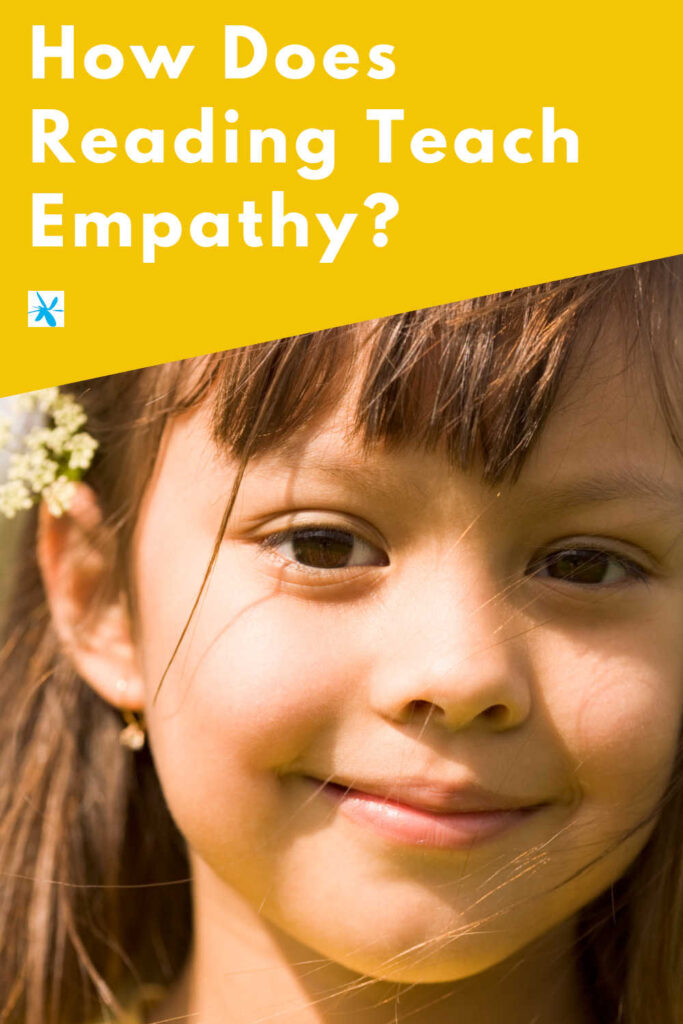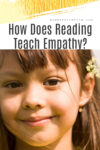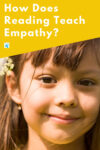How Does Reading Teach Empathy?
How does reading Teach Empathy? The two may not sound related at first but when you dig a little deeper they have a strong connection.
In a fast-paced world filled with screens and distractions, the simple act of reading holds immense power, especially in shaping the hearts and minds of our children.
Beyond expanding vocabulary and stimulating imagination, reading plays a profound role in fostering empathy — a vital skill that allows kids to understand and connect with the experiences and emotions of others.
This post contains affiliate links.

Let’s delve into how the magic of storytelling ignites empathy in young hearts. Because Teaching Social Emotional Skills begins at home.
Teach Empathy with Reading
In a world that sometimes feels hectic and divided, Teaching Empathy to Kids so they understand and care about others is more important than ever.
While there are many ways to cultivate empathy in kids, one of the most powerful tools is right at our fingertips: books.
Yes, you read that correctly — reading can be a powerful catalyst for developing empathy in children. Let’s explore how diving into stories can transform young hearts and minds.
These Childrens Books About Empathy are a great place to start!
Walking in Another’s Shoes
When children immerse themselves in a book, they embark on a journey through the eyes of characters who may be different from themselves.
Whether it’s a protagonist from a different culture, background or with unique challenges, reading allows kids to step into someone else’s shoes and see the world from a new perspective.
You, Me and Empathy: Teaching children about empathy, feelings, kindness, compassion, tolerance and recognising bullying behaviours Learning to Listen, Learning to Care: A Workbook to Help Kids Learn Self-Control and Empathy
Learning to Listen, Learning to Care: A Workbook to Help Kids Learn Self-Control and Empathy UnSelfie: Why Empathetic Kids Succeed in Our All-About-Me World
UnSelfie: Why Empathetic Kids Succeed in Our All-About-Me World The Kindness Curriculum: Stop Bullying Before It Starts
The Kindness Curriculum: Stop Bullying Before It Starts
This firsthand experience of different lives and emotions helps children develop empathy by expanding their understanding of diverse human experiences.
Emotional Connections
Stories have a remarkable ability to evoke emotions in readers. As children become invested in the lives of fictional characters — celebrating their triumphs, empathizing with their struggles, and mourning their losses — they naturally begin to develop a deeper understanding of human emotions.

Through the highs and lows of storytelling, kids learn to recognize and empathize with a wide range of feelings, laying the foundation for compassionate interactions with others in real life.
Understanding Others’ Perspectives
Reading exposes children to a multitude of perspectives and viewpoints, encouraging them to consider alternative ways of thinking and feeling.
Whether it’s through a character’s inner dialogue, their interactions with others, or the unfolding of complex plot lines, books provide valuable opportunities for kids to explore different viewpoints and understand the motivations behind diverse actions and decisions.
Key Education Social Skills Boxed Game Set, 15 Board Games With Social Emotional Learning Activities Learning Resources All About Me Feelings Activity Set – Social Emotional Learning Games,
Learning Resources All About Me Feelings Activity Set – Social Emotional Learning Games, Learning Resources Be Kind Cubes
Learning Resources Be Kind Cubes Key Education Social Skills Activities for Kids
Key Education Social Skills Activities for Kids
This practice of seeing the world through multiple lenses nurtures empathy by teaching children to appreciate the complexity of human experiences.
Empathy in Action
As children immerse themselves in stories filled with characters facing challenges, conflicts, and moral dilemmas, they are presented with opportunities to consider how they would act or feel in similar situations.
This process of vicarious exploration allows children to practice empathy in a safe and supportive environment.

By empathizing with fictional characters and contemplating their choices, kids develop their capacity to understand and relate to the feelings and experiences of real people they encounter in their lives.
Building Bridges of Connection
Reading not only deepens children’s understanding of others but also fosters connections with their peers.
When kids discuss books with friends or family members, they share their thoughts, reflections, and emotional reactions, creating bonds based on shared experiences.
Positive Discipline: The First Three Years, Revised and Updated Edition: From Infant to Toddler–Laying the Foundation for Raising a Capable, Confident How to Talk So Kids Will Listen & Listen So Kids Will Talk
How to Talk So Kids Will Listen & Listen So Kids Will Talk The Happiest Toddler on the Block: How to Eliminate Tantrums and Raise a Patient, Respectful, and Cooperative One- to Four-Year-Old
The Happiest Toddler on the Block: How to Eliminate Tantrums and Raise a Patient, Respectful, and Cooperative One- to Four-Year-Old Positive Discipline: The Classic Guide to Helping Children Develop Self-Discipline, Responsibility, Cooperation, and Problem-Solving Skills
Positive Discipline: The Classic Guide to Helping Children Develop Self-Discipline, Responsibility, Cooperation, and Problem-Solving Skills
These conversations provide opportunities for children to express empathy, validate each other’s perspectives, and learn from one another’s insights, strengthening their social and emotional skills in the process.
Empathy in Everyday Life
The empathy cultivated through reading extends far beyond the pages of a book.
As children internalize the lessons and insights gained from their literary adventures, they begin to apply their empathy skills to real-life situations.
Whether it’s comforting a friend who is upset, standing up for someone who is being treated unfairly, or simply offering a listening ear, empathetic children demonstrate kindness, understanding and compassion in their interactions with others.
Nurturing a Lifelong Love of Reading
Finally, the beauty of using reading to teach empathy lies in its sustainability.
Unlike fleeting trends or temporary activities, the love of reading is a gift that can last a lifetime.
By instilling a passion for books and storytelling in children from a young age, parents and educators lay the groundwork for a lifelong journey of empathy, curiosity and personal growth.
You see, reading is more than just a leisure activity with your child — it’s a powerful tool for nurturing empathy in your children.
Through the pages of a book, kids embark on transformative journeys that expand their understanding, deepen their emotional intelligence and cultivate their capacity to care for others.
Let’s continue to encourage our young readers to explore new worlds, empathize with diverse characters and embrace the profound impact of stories on their hearts and minds.
After all, in a world that could always use a little more empathy, the lessons learned from a good book can make all the difference.
More Emotional Learning Resources
In today’s fast-paced and dynamic environment, the importance of emotional intelligence is a crucial skill set for personal and professional success for our children.
- SEL & Growth Mindset Lesson Plans
- 25 Calm Down Breathing Exercises for Kids
- Emotions Preschool Activities
- ABC Growth Mindset Cards
- Emotional Intelligence Kit
- Emotions Social Story
- Draw & Write Emotions
- Emotional Regulation Starter Kit
- Embracing Emotions with Yoga
- ABC Calm Down Cards
- Emotional Regulation Strategies
These emotional learning resources foster emotional intelligence, empathy and self-awareness.















